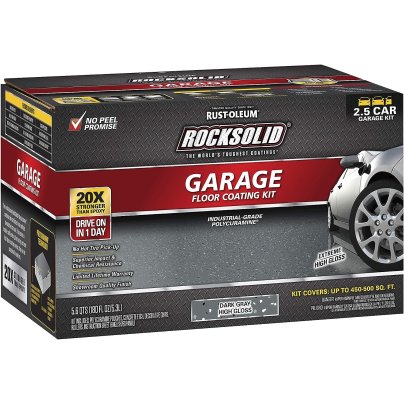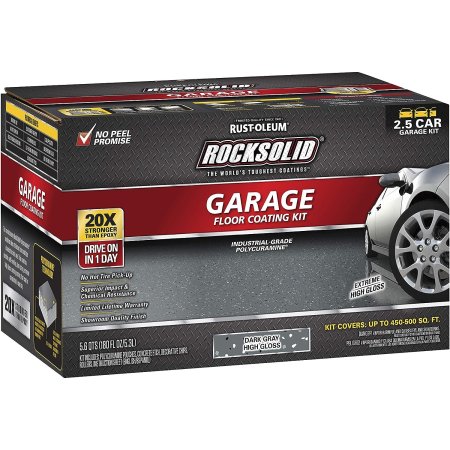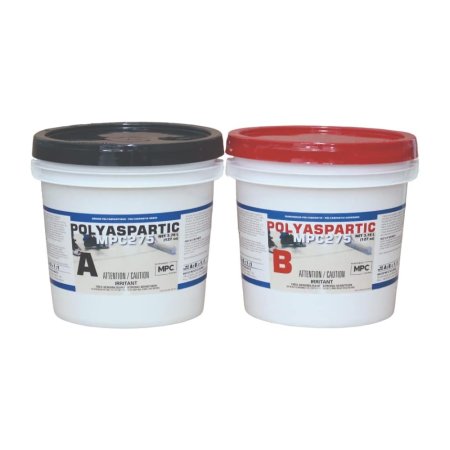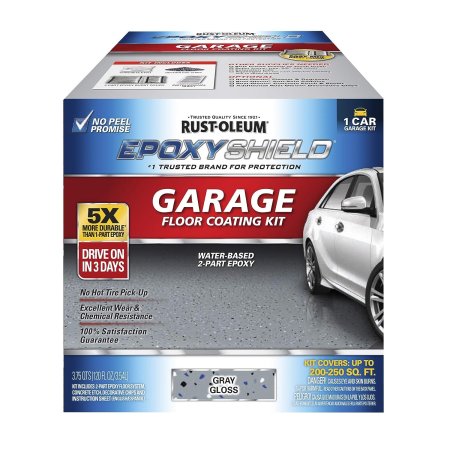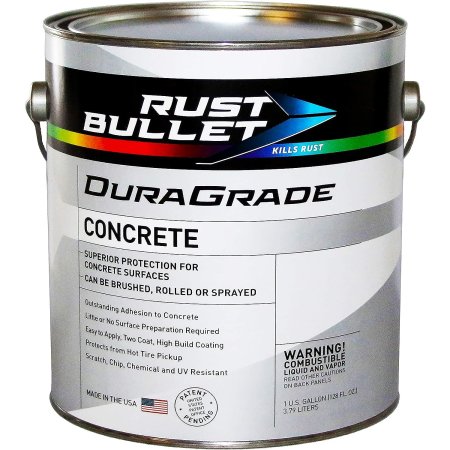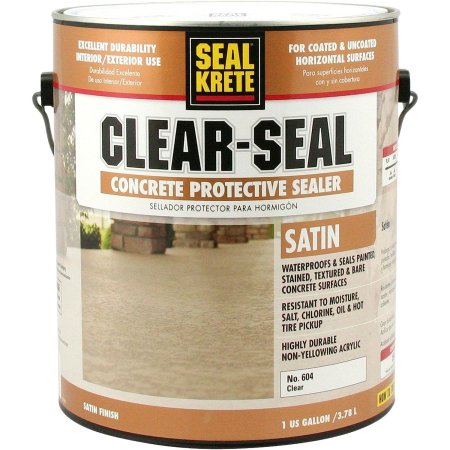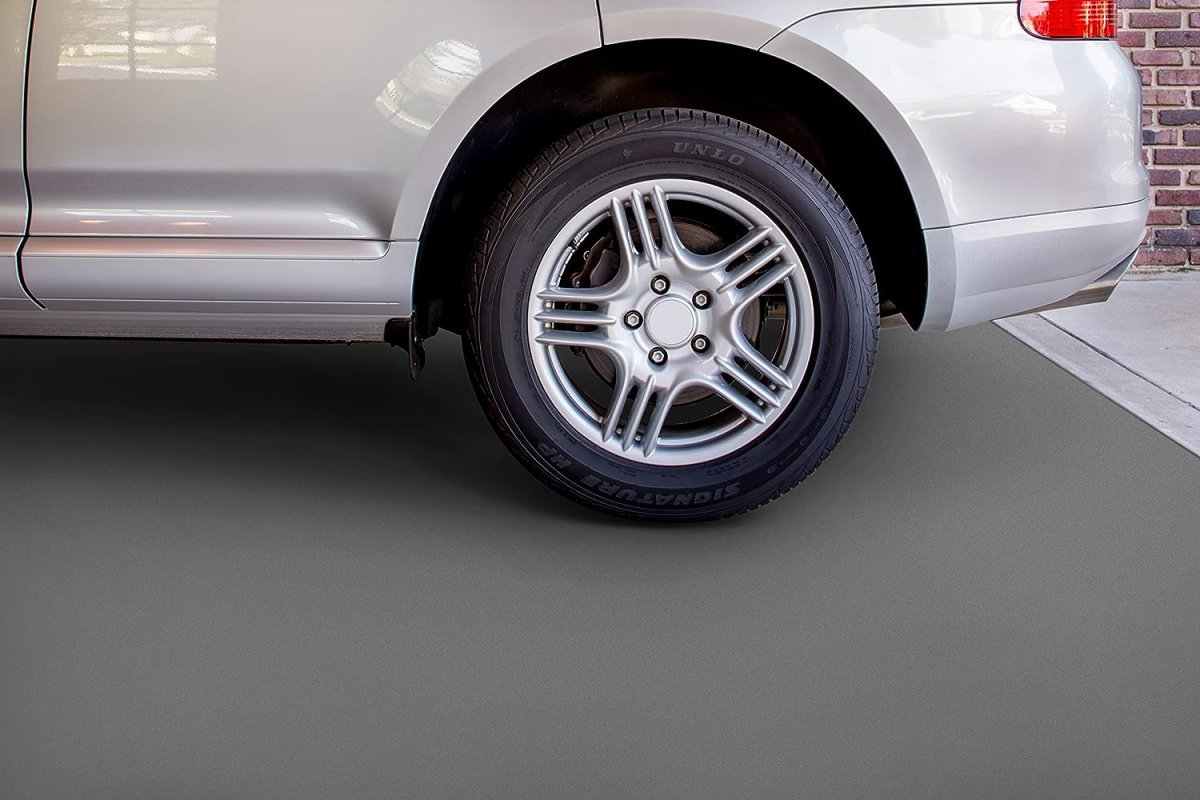
We may earn revenue from the products available on this page and participate in affiliate programs. Learn More ›
A quality garage floor coating offers several valuable benefits. It’s particularly good at protecting a concrete floor, which otherwise can flake and crack. Some coatings provide added grip, making the garage floor safer. It can also make the floor easier to clean and improve appearance, which may increase the value of your home.
The challenge is choosing the right garage floor coating to complement how you use the space. Several types are available, from easy-to-apply latex floor paint to more DIY-intensive epoxy kits. To help you find the best option for your space, we researched dozens of highly rated garage floor coverings and compiled a list of the best. Our favorite is the Rust-Oleum RockSolid Garage Floor Coating due to its extreme durability and wide range of color choices.
We also interviewed Dan Thrasher, CEO of Hello Garage, headquartered in Papillion, Nebraska, for his expert insight on choosing and applying a long-lasting floor finish. Read on for a curated list of the best garage floor coatings, as well as key shopping insights.
- BEST OVERALL: Rust-Oleum RockSolid Garage Floor Coating
↓ Jump to Review - BEST BANG FOR THE BUCK: Kilz 1-Part Epoxy Concrete & Garage Floor Paint
↓ Jump to Review - BEST POLYUREA: Master Protective Coatings Polyaspartic Floor Coating
↓ Jump to Review - BEST EPOXY: Rust-Oleum EpoxyShield Garage Floor Coating Kit
↓ Jump to Review - BEST LATEX: Drylok Low Sheen Latex Concrete Floor Paint
↓ Jump to Review - BEST NONSLIP: Rust Bullet DuraGrade Concrete Coating
↓ Jump to Review - BEST SEALER: Seal-Krete Clear-Seal Concrete Protective Sealer
↓ Jump to Review
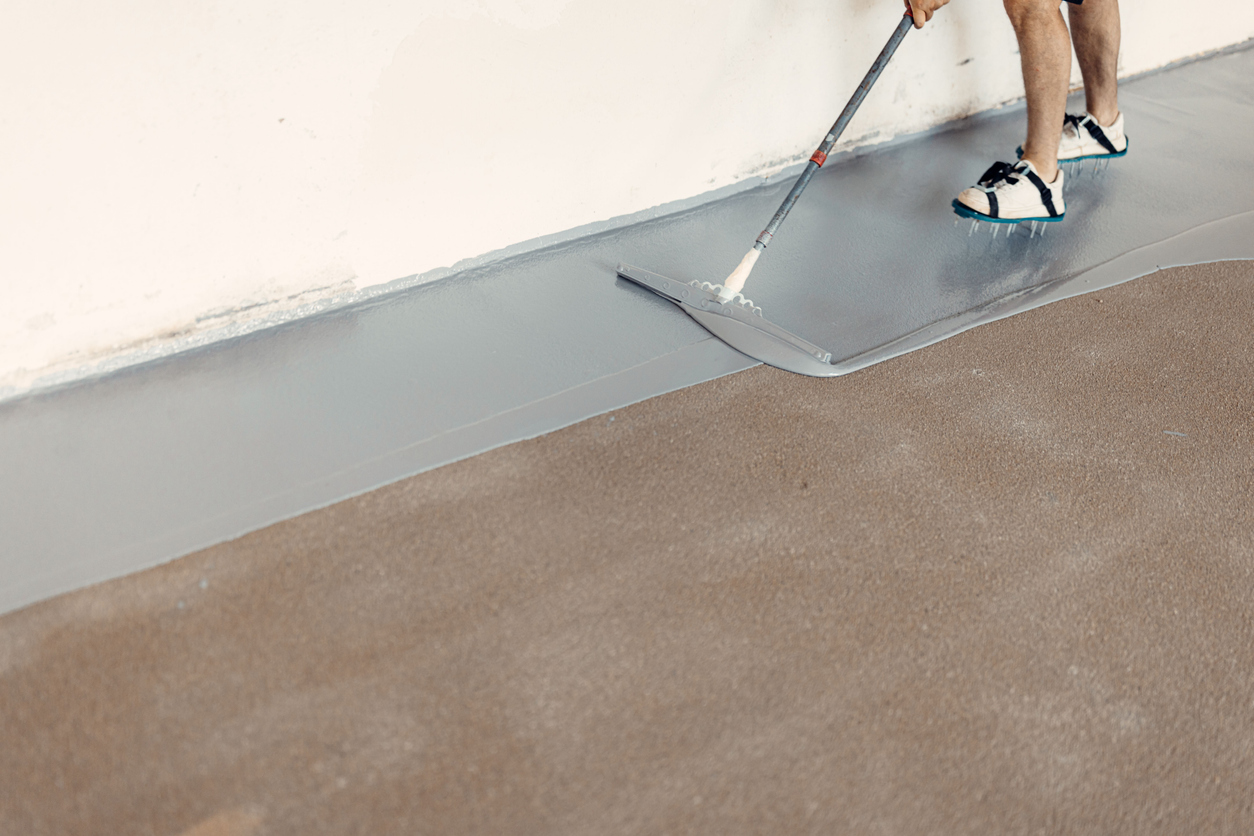
| Type | Coverage | Ease of Application | |
| Rust-Oleum RockSolid Garage Floor Coating | Unique combination of epoxy, polyurea, and urethane | 450 to 500 square feet | Moderate |
| Kilz 1-Part Epoxy Concrete & Garage Floor Paint | Epoxy acrylic | 300 to 500 square feet | Easy |
| Master Protective Coatings Polyaspartic Floor Coating | Polyaspartic polyurea | Up to 200 square feet per gallon | Moderate |
| Rust-Oleum EpoxyShield Garage Floor Coating Kit | 2-part epoxy | 200 to 250 square feet | Moderate |
| Drylok Low Sheen Latex Concrete Floor Paint | Latex with ceramic additives | 300 to 400 square feet | Easy |
| Rust Bullet DuraGrade Concrete Coating | Polyurethane | Up to 350 square feet | Easy |
| Seal-Krete Clear-Seal Concrete Protective Sealer | Acrylic with urethane | Up to 300 square feet | Easy |
Our Top Picks
We thoroughly researched the following best garage floor coatings on the market for DIY application. Each of these recommendations has been assigned a category so that you’ll have quick and easy access to information relevant to your needs.
Best Overall
Rust-Oleum RockSolid Garage Floor Coating
What We Like
- Self-leveling formula is 20 times tougher than epoxy
- Low-odor and eco-friendly coating
- Vehicle-ready in 24 hours
- 6 high-gloss colors available
What We Don’t Like
- Pricey compared to other options
- Some buyers report patchy results
Specs
- Type Unique combination of epoxy, polyurea, and urethane
- Coverage 450 to 500 square feet
- Ease of application Moderate
Rust-Oleum claims its RockSolid garage floor coating is 20 times tougher than epoxy alone. It uses a proprietary combination of epoxy, polyurea, and urethane called Polycuramine. In addition to durability, the polyurea and urethane elements make it one of the best crack sealers we found. It comes in easy-to-mix burst pouches, is available in six high-gloss colors, and includes decorative chips (though their use is optional).
We like that Rust-Oleum RockSolid is self-leveling with low odor and low VOCs. You can walk on it in around 8 to 10 hours, and it can be driven on in 24 hours. Once cured, it’s resistant to oils, fuels, and most chemicals.
While this is probably the most durable DIY garage floor coating, careful preparation is a must. Complaints are rare, but this product is comparatively expensive, and some buyers felt the number of feet of coverage wasn’t as high as advertised.
Get the Rust-Oleum RockSolid garage floor coating at Amazon, The Home Depot, Walmart, or Menards.
Best Bang For The Buck
Kilz 1-Part Epoxy Concentrate & Garage Floor Paint
What We Like
- Water-based product has low environmental impact
- Comes at a budget-friendly price
- Helps prevent concrete from cracking, peeling, or blistering
- Can be applied indoors or outdoors
What We Don’t Like
- One week drying time before vehicle traffic
- Must wait 30 days before cleaning
Specs
- Type Epoxy acrylic
- Coverage 300 to 500 square feet
- Ease of application Easy
Kilz single-part epoxy garage floor paint is as easy to use as ordinary household paint but is tougher thKilz single-part epoxy paint for garage floors is as easy to use as ordinary household paint but is tougher thanks to the addition of epoxy. Apply it straight from the can using a brush, pad, roller, or spray gun. It’s water-based, so cleanup just requires soap and water. The basic color range is limited to white and two grays.
Kilz epoxy acrylic can be walked on in 24 hours but should be left a week for tire traffic. While it isn’t as hard-wearing as two-part epoxy, it does offer good scuff resistance and helps stop common problems with concrete like cracking, peeling, and flaking. Given the very competitive price, it is an ideal floor coating for low-use garages.
What our tester says: Glenda Taylor, a Bob Vila staff writer and product tester, notes in the Best Concrete Paint that “this concrete floor paint from Kilz applies as easily as latex paint (no mixing here) but has the high-durability characteristics of an epoxy product. It withstood both water and abrasion resistance testing.”
Get the Kilz garage floor coating at Amazon, Lowe’s, or Walmart.
Best Polyurea
Master Protective Coatings Polyaspartic Floor Coating
What We Don’t Like
- Recommended for high-use garage floors
- Crystal-clear finish won’t yellow over time
- Offers excellent adhesion to surfaces
- Provides unrivaled chemical and abrasion resistance
What We Don’t Like
- Requires time-consuming preparation
- Contains toxic, solvent-based ingredients
Specs
- Type Polyaspartic polyurea
- Coverage Up to 200 square feet per gallon
- Ease of application Moderate
Polyaspartic polyurea combinations are widely acknowledged as the toughest of garage floor coatings. However, complex application requirements mean that they are usually only available to professional installers. The Master Protective Coatings (MPC) two-part formula is one of few offered to DIY users. It is known for excellent adhesion to a variety of surface materials and creates an extremely hard-wearing barrier that is resistant to most oils, fuels, and chemicals. The finish is clear, high gloss, and does not fade or go cloudy.
Coverage will vary depending on the surface and is unlikely to exceed 200 square feet per gallon. This makes MPC polyaspartic polyurea quite an expensive option. While the application itself is not difficult, careful preparation of the floor is necessary, and once the two parts are mixed, it only remains workable for an hour. Both parts are solvent-based and contain toxic ingredients.
Get the Master Protective Coatings garage floor coating at Amazon.
Best Epoxy
Rust-Oleum EpoxyShield Garage Floor Coating Kit
What We Like
- Provides a long-lasting, hard-wearing surface
- High resistance to abrasion, gasoline, antifreeze, and more
- Can be applied with a brush or roller
What We Don’t Like
- Curing may be slow
- Some buyers reported parts failed to mix properly
Specs
- Type 2-part epoxy
- Coverage 200 to 250 square feet
- Ease of application Moderate
TTwo-part garage floor epoxy is a popular choice for concrete flooring thanks to its toughness and affordability. Rust-Oleum’s EpoxyShield provides a high-gloss finish, is available in three colors, and can be enhanced with the included decorative chips if desired. Once fully cured, which takes around 3 days, the surface is resistant to abrasion, motor oils, gasoline, antifreeze, and salt. It also helps prevent concrete from cracking.
Rust-Oleum EpoxyShield is water-based, so cleanup is easy. It’s both low odor and low VOC; however, the packaging warns that it can burn eyes and skin, so care is needed. Working time is around 2 hours when mixed (depending on ambient temperature), so it’s more forgiving than some, though it’s still important to follow instructions carefully.
Get the Rust-Oleum EpoxyShield garage floor coating at Amazon, The Home Depot, Ace Hardware, or Walmart.
Best Latex
Drylok Low Sheen Latex Concrete Floor Paint
What We Like
- All-in-1 concrete primer and paint with low-VOC formula
- Creates a low-glare, anti-slip surface
- Ceramics added for improved wear resistance
- Offered in a variety of colors
What We Don’t Like
- Periodic recoating will be necessary
Specs
- Type Latex with ceramic additives
- Coverage 300 to 400 square feet
- Ease of application Easy
Most people know latex paint as a decorative wall covering. The paint can be attractive but is not durable enough for floors. Drylok’s latex concrete floor paint overcomes the problem with what the company calls a ceramic x-linking formula, providing added toughness. It is ready to use straight from the can, doesn’t need a primer, and is easy to apply with a brush or roller.
This multisurface coating is suitable for concrete, brick or block patios, and even wooden steps. It can be used indoors or out. The finish is non-reflective and also nonslip for added safety. It is dry enough for foot traffic after 24 hours but requires 5 days before it is ready for vehicle use.
Get the Drylok garage floor coating at The Home Depot or Walmart (2-pack).
Best Nonslip
Rust Bullet DuraGrade Concrete Coating
What We Like
- Hard-wearing coating, cures in 72 hours
- Anti-skid layer as an extra for maximum safety
- High resistance to impact, cracking, and abrasion
- Available in 18 colors, plus optional flakes
What We Don’t Like
- One of the more expensive coatings
- Can thicken dramatically if stored too long
Specs
- Type Polyurethane
- Coverage Up to 350 square feet
- Ease of application Easy
Slippery garage flooring can be a real danger for people who work in the space regularly. While several of the best garage floor coatings have nonslip properties, Rust Bullet is the only one that offers a specific anti-skid layer that can be added on top of the base polyurethane. It does involve extra cost, but it’s a relatively modest sum to ensure safety in a workshop or hobby area.
Rust Bullet DuraGrade can be applied directly to concrete and has excellent adhesion. It is scratch-, chip-, chemical-, impact-, abrasion-, and ultraviolet-resistant with low VOCs. No priming or etching is necessary, and it is easy to apply using a brush, roller, or spray equipment. There are 18 colors to choose from, and decorative chips can be added (though a clear top coat would then need to be applied).
Get the Rust Bullet garage floor coating at Amazon, Lowe’s, or Walmart.
Best Sealer
Seal-Krete Clear-Seal Concrete Protective Sealer
What We Like
- Creates a protective waterproof barrier
- Works on painted, stained, or bare concrete surfaces
- Water-based low-VOC acrylic fortified with urethane
- UV-, weather-, and chemical-resistant formula
What We Don’t Like
- Works on most but not all surfaces
- Some buyers experienced poor results
Specs
- Type Acrylic with urethane
- Coverage Up to 300 square feet
- Ease of application: Easy
One of the easiest and quickest ways to protect a garage floor is by using a sealer. Seal-Krete Clear-Seal penetrates the surface to help prevent flaking and peeling, plus it dries to provide a waterproof, stain-resistant barrier. It goes on milky and dries clear, enhancing the color of the underlying surface material. We appreciate that satin, low gloss, and gloss finishes are available and that it can be used on painted, stained, or bare concrete. Two coats may be necessary for optimal protection.
The low-VOC water-based nonyellowing formula has urethane added for greater durability. It is resistant to moisture, ultraviolet light, oil, salt, and chlorine, so Seal-Krete Clear-Seal can be used for the garage as well as outside on paths, patios, and pool surrounds.
Get the Seal-Krete garage floor coating at Amazon, Lowe’s, The Home Depot, Walmart, or Ace Hardware.
Jump to Our Top Picks
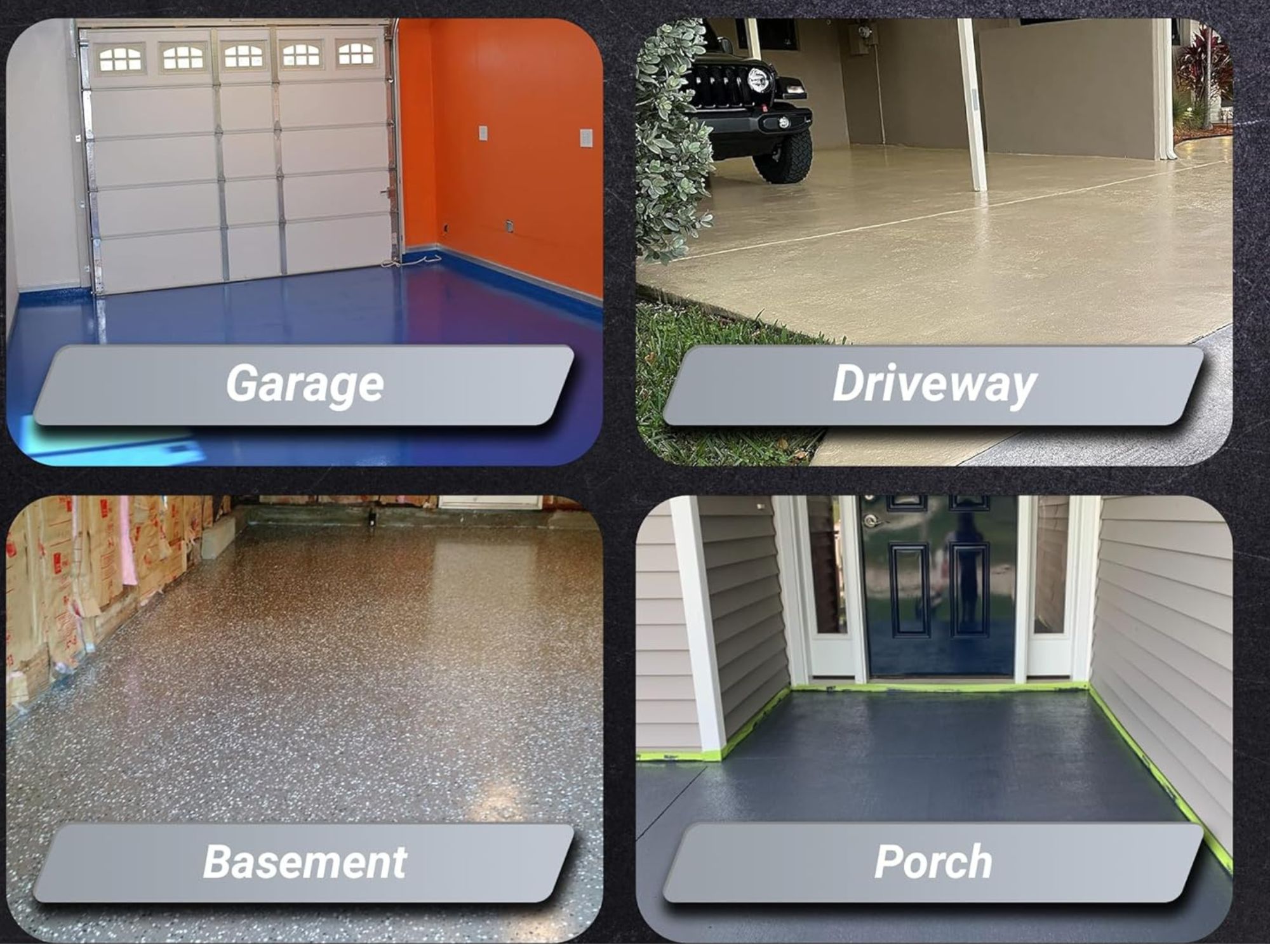
How We Chose the Best Garage Floor Coatings
People use their garages for many purposes. While some simply park their vehicles inside, others turn them into workshops, hobby or craft spaces, or dance or exercise studios.
During our research, we wanted to ensure we provided garage floor options for every purpose and budget. In collating this list, we looked at chemical composition, ease of application, coverage, durability, and color options. Price is always a major factor, but value for money isn’t just about low cost; the finish also needs to be hard-wearing.
Sustainability also had an impact. Where possible, we chose eco-friendly water-based products, though unfortunately, some of the toughest options are still solvent-based. In this case, we looked for low volatile organic compound (VOC) levels and low odor to maximize user safety.
What to Consider When Choosing a Garage Floor Coating
Garage floor coatings have many benefits. “The first is enhanced durability, your floor will be protected from wear and tear from vehicles and surface deterioration,” advises Thrasher. A good garage floor coating can also protect your concrete floor from stains, make it easier to clean, and improve the look of the space. However, not all coatings offer the same protection.
Different types of garage floor coatings have different chemical properties. It’s worth looking into the practicalities of applying them, how long they might be expected to last, each garage floor coating cost, and what they will look like before making a decision.
Ease of Application
Latex is the easiest to apply covering for garage floors. It’s very safe, has a low odor, is fast drying, and is easy to clean up. Most can be applied with a brush, roller, or spray gun and can be used straight from the can without a primer. Acrylic is similar, though it often takes longer to dry.
The unique polyurethane formula used by Rust Bullet is also easy to use, though it may require several coats and takes around 72 hours to fully cure. The term “cure” is used rather than “dry” because drying simply involves the evaporation of water, whereas curing means the product solidifies.
Epoxies are two-part products that need to be mixed before use. It’s important to follow instructions carefully for optimal results. Epoxy garage floor coatings take longer to cure, typically 7 days or more. Some are quite challenging to use, so it may be worth calling in the pros. Polyurea and polyaspartic coatings are not normally recommended for DIY use, though the occasional exception does exist.
As always, it’s vital to read instructions. Some of these products are flammable or produce noxious vapors. They may also be toxic. It’s advisable to wear eye protection and not to leave skin exposed.
Durability and Longevity
It’s important to consider how you use the garage while in the process of choosing the best garage floor covering. If you only use the garage for parking or storage, latex or acrylic coatings may suit your needs. The floor will probably have to be repainted every couple of years, but the job can be done in a day.
Spaces that are used frequently need tougher garage floor protection options, and epoxy is the most popular in terms of price and performance. It is resistant to oil, fuel, and many other chemicals and is usually easy to keep clean. While longevity will always vary depending on wear rates, it is reasonable to expect a garage floor epoxy coating to last 10 years.
Polyurea and polyaspartic coatings are super tough. In addition to the properties offered by epoxy, these are also impact-resistant. When installed properly, they can last 20 years or more in even the harshest environments.
Appearance
While gray and white are perhaps the most common choices for garage floors, today’s high-performance coatings are available in a wide range of colors as well as matte, satin, or high-gloss finishes. There are also optional “inclusions” (such as flakes) that can result in a very attractive surface.
Concrete sealers are often clear. Latex and acrylic usually come in fairly muted colors and a matte finish. The appearance options get more interesting with Rust Bullet’s polyurethane and with many epoxies. Bright colors are available, and chips can be added to give a high-quality Terraza-like appearance. Some have an inherently anti-skid surface for added safety, or they can be added as a top coat.
Types of Garage Floor Coatings
Understanding the performance of each finish type is a key aspect of finding the most suitable floor covering for garage floors. Some types are more hard-wearing than others, which will be important for those who use their garage frequently. For those who just want to smarten the place up, a finish that is cheaper and easier to apply may be a better choice.
Epoxy
Epoxy is one of the most popular choices for garage floor coatings. These are usually two-part products that need to be mixed before use. One-part epoxy also exists, but it is actually latex or acrylic paint with a small amount of epoxy resin added. The latter is easy to use and often very affordable, but it is nowhere near as durable.
Two-part epoxy is good at filling minor cracks and, once fully cured, can be extremely tough. “Do-it-yourself kits for epoxy floors are available at big box stores,” says Thrasher. “Most do-it-yourselfers could handle this type of installation because they offer a chemical etch to prep the floor.” However, some of the hardest-wearing types can be challenging to apply, so it may be worth contacting a professional epoxy garage floor installer if you aren’t confident in your abilities.
Polyurea
Technically speaking, polyurea is an elastomer made by combining isocyanate and amine (an ammonia derivative). In basic terms, it is a kind of polyurethane, a varied group of plastics known for toughness and elasticity. One of polyurea’s common uses is for making truck-bed liners.
Polyurea is resistant to water and most chemical spills. It cures reasonably quickly, creating a very hard-wearing barrier, and is a favorite in commercial situations. However, polyurea garage floor coatings are usually expensive and almost invariably require professional application. As a result, they are not something generally available to typical customers. That said, polyurea is sometimes combined with epoxy for DIY use.
Polyaspartic
Polyaspartic coating is an aliphatic (carbon-based) polyurea. Its main benefits are that it can be applied over a much wider temperature range (in some cases from -30 degrees Fahrenheit up to 140 degrees Fahrenheit), and it is usually more forgiving to work with than polyurea, which tends to dry and cure very quickly. Additionally, polyaspartic is unaffected by any moisture within concrete garage floors. According to Thrasher, it’s among the best choices for reducing cracks and hot tire pickup but requires proper floor preparation for adhesion.
A polyaspartic coating is usually crystal clear and won’t yellow over time. It adheres to concrete well and will penetrate deep cracks, though it shouldn’t be considered a concrete crack filler repair product. It has high stain and chemical resistance and high heat tolerance, too.
As with polyurea, polyaspartic coating costs are high and should be applied by a suitably experienced contractor.
Latex and Acrylic
Most people will be familiar with latex and acrylic as a decorative product for walls. These concrete floor paint finishes are usually water-based and, as a result, can be a more environmentally friendly option. Cleanup is easier than mineral or spirit-based alternatives. Generally speaking, concrete and garage floor paint are less expensive than other types of coatings.
Latex dries fast and is easy to apply, but it’s probably the least durable of these products and won’t prevent a concrete garage floor from cracking. Acrylic is equally user-friendly and a little tougher, with a higher percentage of epoxy that provides a degree of elasticity. However, it is more expensive than latex. Both are worth considering as a quick fix, though not for garages that are used for workshop or hobby purposes.
Cementitious Urethane
As you might guess from the name, cementitious urethane’s main components are cement and liquid urethane (a type of polymer). Water, aggregates, and a variety of other compounds may be added, though it’s usually necessary to look at technical specifications to find out which. It is self-leveling, creates a seamless surface that is stain- and chemical-resistant, and is easy to clean. However, it is expensive, needs to be installed professionally, and is more suitable for commercial applications.
Urethane is sometimes used in other formulations that are not cementitious, and these are perfectly OK for garage floors. Performance is similar to that of epoxy.
FAQs
We’ve provided comprehensive information to help you choose the best garage floor coatings for your space. A few questions that come up regularly are answered below.
The best color for a garage floor will often depend on how it is used. Dark colors hide dirt well. Bright colors reflect light better, so they are a good choice if the garage is used for work or hobbies. Neutral grays are a popular compromise. Leading brands of garage floor coatings often offer several alternatives, so it shouldn’t be difficult to find the color that meets your needs.
There are a number of garage floor paints available, and they are easy to apply with reasonably fast drying times. Painting a garage floor can be a good idea when it’s only used for parking vehicles, bicycles, or lawnmowers, but if it doubles as a workshop, something more durable may be preferred.
Polyurea and polyaspartic products generally offer the strongest garage floor finishes, but they are expensive and difficult to apply. It’s usually a job for a professional installer, which adds to the cost. Rust-Oleum RockSolid garage floor coating combines polyurea with urethane and epoxy, providing hard-wearing results from a coating suitable for DIY application.
The cheapest way to seal a garage floor is with an epoxy acrylic like Kilz garage floor coating or a concrete sealer like Seal-Krete garage floor coating. They are easy to use and deliver good all-around performance. However, there is a limit to their durability, and they may have to be applied more frequently than other products.
Garage floor coatings can improve the aesthetics and cleanability of your concrete floor. Some even have anti-slip properties, making the garage a safer place to work. Whether a garage floor coating is worth it depends on how often you use your garage, your budget, and your preferences.
Why Trust Bob Vila
Bob Vila has been America’s Handyman since 1979. As the host of beloved and groundbreaking TV series including “This Old House” and “Bob Vila’s Home Again,” he popularized and became synonymous with “do-it-yourself” home improvement.
Over the course of his decades-long career, Bob Vila has helped millions of people build, renovate, repair, and live better each day—a tradition that continues today with expert yet accessible home advice. The Bob Vila team distills need-to-know information into project tutorials, maintenance guides, tool 101s, and more. These home and garden experts then thoroughly research, vet, and recommend products that support homeowners, renters, DIYers, and professionals in their to-do lists.
